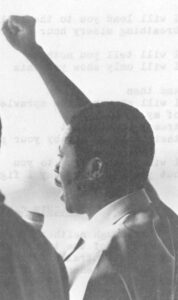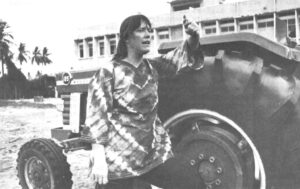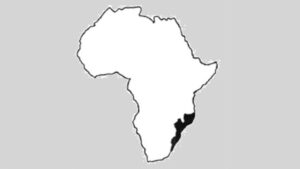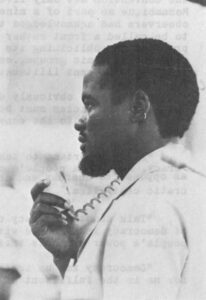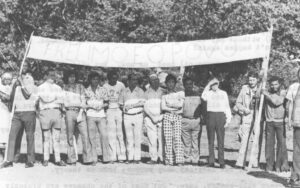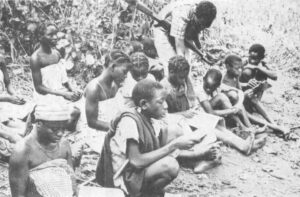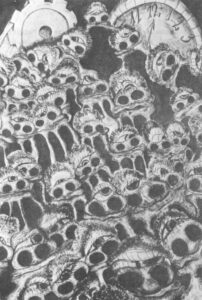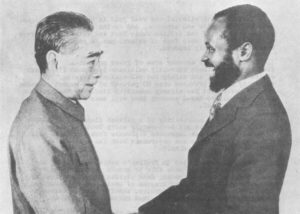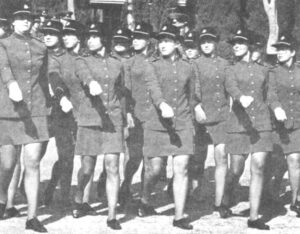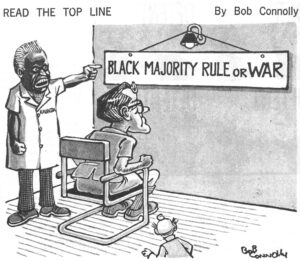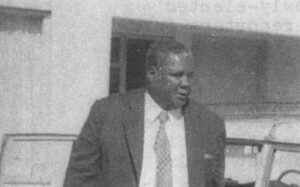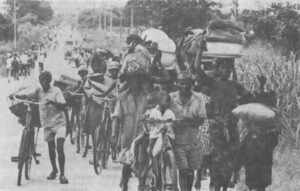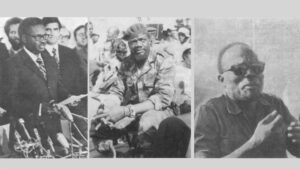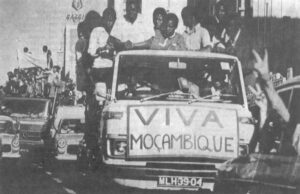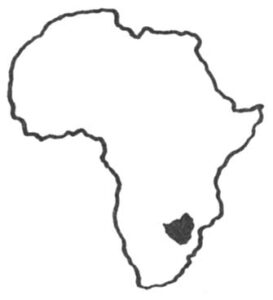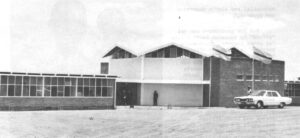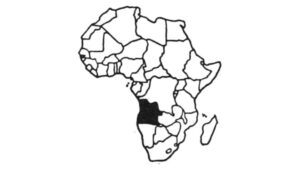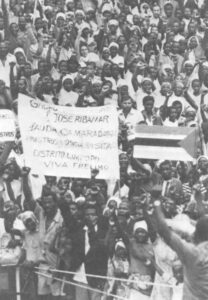“Rhodesia faces its final hour.” “The Armageddon is on.” “The blindness of Rhodesia.” With those alarming words, the world press has headlined its view that white domination in the rebellious southern African colony is just about over.
Yet the government of Prime Minister Ian Smith is not willing to concede that black majority rule is inevitable. In fact, quite the contrary. Rhodesia has launched two major campaigns to combat the impact of the estimated 12,000 guerrillas based in neighboring Mozambique: a full-scale call-up of all males between 18 and 35, and a fierce propaganda campaign to boost morale among the 280,000 whites — outnumbered 22:1 by Africans.
Robin Wright recently visited Rhodesia to assess the mood of the country as the guerrilla war escalates. The following report looks at the propaganda effort and its impact on the minority white community.
Salisbury, Rhodesia
The sedate bar on Salisbury’s main avenue had suddenly taken on a festive air with the addition of bright stickers on the dark wood walls, tables, bar stools and cash register.
But the slogans on the stickers were far from gay:
“Speak now and we’ll know no peace,” a turquoise sticker warned.
“Think about national security. Don’t talk about it.”
“Your tongue could pull a trigger,” a chartreuse sticker declared.

Among the others:
“Women’s lib is one thing, women’s lip another.”
“What you’ve just said may blow up a truck.”
“Is your conversation killing?”
“An open mouth makes a big target.”
Even the public lavatory had its own version: “Are you having a security leak?”
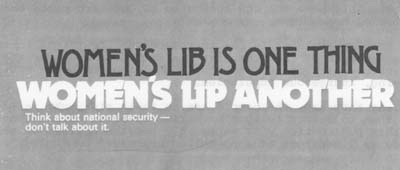
The slogan-stickers are part of a massive propaganda campaign launched at the beginning of the year to boost morale and counter the ominous warnings from abroad that Rhodesia’s white population must now make way for the majority black population.
The campaign was intensified after the collapse of efforts at peaceful settlement between Rhodesian Prime Minister Ian Smith and black nationalist leader Joshua Nkomo in March and the subsequent escalation of guerrilla attacks from across the 800-mile border shared with Mozambique.
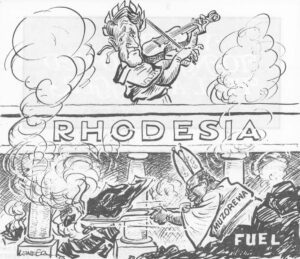
“Outsiders are over-dramatizing Rhodesia’s problems,” a senior government official explained. “We are trying to clarify the situation by providing our people with the facts so there won’t be unnecessary alarm.”
But the campaign is not limited to the 6.3 million Rhodesian population. One of the latest additions is an airletter, printed by the government, for distribution to relatives and friends abroad. Postal authorities claim over 15,000 have been sent overseas. An excerpt:
“No doubt you are worried about the situation in Rhodesia, particularly in view of all the sensational headlines and horrific articles which appear in the press. The psychological war being waged against Rhodesia through many of the news media has escalated to such proportions of misrepresentation that many observers outside this country find it difficult to separate fact from fiction.”
“Scores of journalists from all over the world have descended upon Rhodesia and, believe it or not, are hard put to find enough to do or see. There are no massacres and bloodbaths, there are no massive terrorist force build-ups, there is no panic or hysteria, and there are no queues of people leaving the country.”
“What much of the world press does not wish to print are the true facts about Rhodesia. That she has weathered the last ten years so well, in terms of internal peace productivity, growth and racial harmony, despite the effects of boycotts and sanctions.”
“We do not deny that Rhodesians are going through difficult times — difficult but not drastic, and compared with most countries in the world today Rhodesians have much to be thankful for.”
Perhaps the single most effective piece of propaganda is the recently re-issued pamphlet “Anatomy of Terror,” full of grisly pictures of innocent Africans and cattle mutilated by the “terrs” — the Rhodesian nickname for the estimated 12,000 terrorists based in neighboring Mozambique. (See photos next page).
From “Anatomy of Terror:” Pictures of alleged atrocities committed by Rhodesian guerrillas against innocent Africans in the northern Mt. Darwin area.
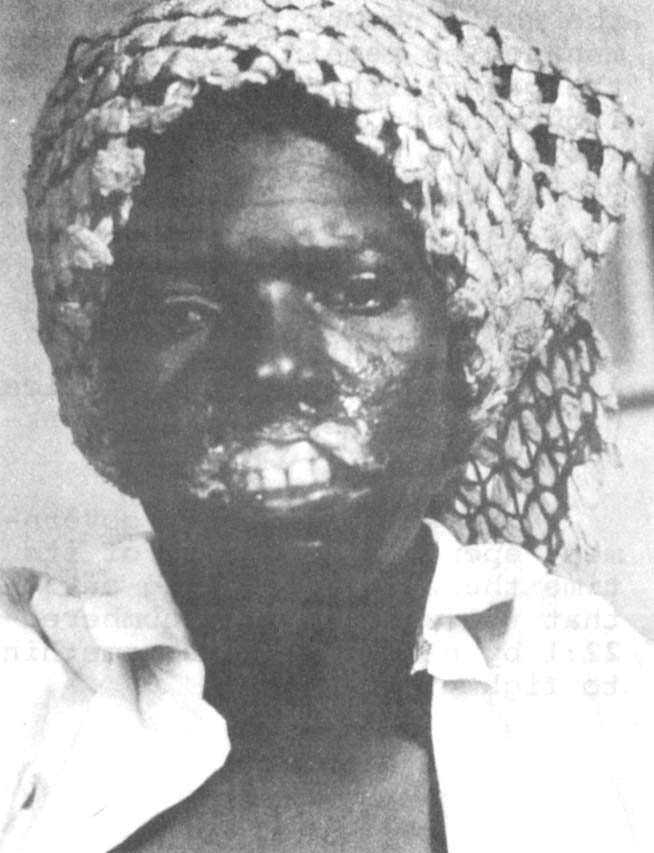
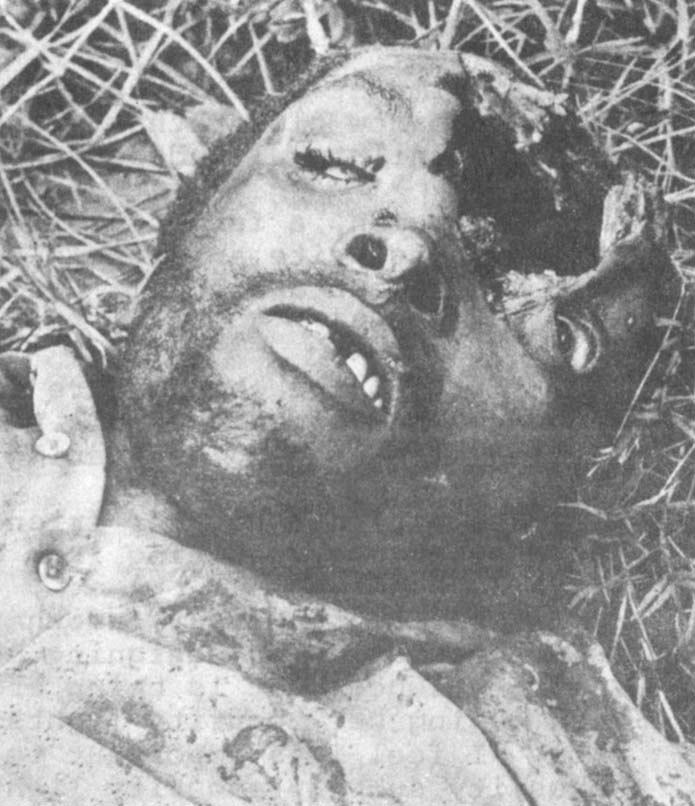
The booklet explains in the introduction: “Outright torture has long been a weapon of the Communist-trained thugs who, for the past 15 years, have been trying to force their philosophies on an unwilling and peace-loving, indigenous population.”
“If, as they say, the people are on their side, why is it necessary for them to resort to such barbarism in order to convince them? Perhaps this publication will serve to prove the caliber of men who masquerade as liberators of a so-called oppressed community.”
A new addition to the growing government campaign — printed on cheap pulp due to the paper shortage — is “Bloody Love,” the tragic story of Chikombe Mazvidza, an African who had his ears, lips and flesh from his nose to his chin cut off by guerrillas when he refused to give them food during a raid in the northeast “operational zone.”
The pamphlet tells graphically and facetiously — “Then as a final token of that love which is only given to great liberators, they forced his wife to roast the flesh on an open fire and eat it.”
His wife, beaten by the raiders, was quoted as saying “They pointed a gun at my head and said to fry the flesh and then to eat it. So I ate and vomited and ate and vomited and they said to keep on eating until it was all finished.”
The author, V. W. Rijnberk, condemns the World Council of Churches — “a vile body” — for supporting the liberation war in Rhodesia and for their statement that “liberation fighters in southern Africa are motivated by love, not hate.”
“Love indeed,” he writes angrily. “A love, that at gunpoint forces a wife to eat her husband’s flesh. Satanic love-sadistic love…bloody love.”
The booklet had immediate impact. Mrs. Elsie Thompson of Bulawayo announced that she was organizing a prayer meeting, but was not inviting the clergy. “Although we have faith in God,” she said, “We are against the church as we feel they have definite communist leanings.”
The impact of this campaign has been immense. The 280,000 whites are now closer than at any time since Prime Minister Smith declared unilateral independence on November 11, 1965.
One woman, a farmer’s wife living on the tense southeast border, was moved to write an article for a Johannesburg paper emphasizing that Rhodesians are coping well with the situation. Mrs. Huddleston wrote:
“Not all the changes are for the worse…. Somehow the danger around us has brought us all together, and there is a tremendous feeling of belonging and caring.”
She outlines how her friends are coping with the new limitations and precautions resulting from guerrilla incursions:
“Mrs. Petro Murray, another farmer’s wife and a keen gardener, is concentrating on designing her garden to fit in with the new security fence that is being erected. Another farmer’s wife is busy making her security lights fit in artistically to light up her pool. ‘I feel it’s important to make the best of everything, even a necessity such as security lights. My garden has never looked so attractive.'”
“The children,” she continues, “think it is lekker (fun) to have army trucks, tents, helicopters and soldiers round every corner, and it is a thrill for them to wave to the troopies as they are transported back and forth from their base to the operational zone.”
The killing of three young South African motorcyclists by terrorists over the Easter weekend did make the first crack in the complacency of the white community. But some managed to remain stoic about the possibilities of escalated incursions. As one housewife wrote in a letter to the editor of the Rhodesia Herald:
“Before we let our emotions get out of hand over the killing of three motorcyclists, let it be pointed out that 165 people died on South African highways over the holiday weekend.”
The white minority government spends a good deal of its time these days pointing out that the whites outnumbered 22:1 by blacks have something to fight for.
Maintaining one of the highest standards of living in the world, the average annual income of whites is eight thousand dollars, while costs are comparatively low, despite United Nations sanctions. Domestic help and industrial or farm labor is cheap at an average of forty dollars a month, and taxes at five percent are low.
The Land Tenure Act divides land into two parts: one-half for the five percent white population and one-half for the 95 percent black population. Eleven times more is spent for the education of a white child than for the average black. And Parliament is controlled by whites with a 50:16 ratio — and half the blacks are government appointed.
The good life, reinforced by government propaganda, has led many Rhodesians to shrug off the telltale signs of trouble: last year over 10,000 whites left the country for good. The black market has increased dramatically as whites try to get their savings out to safer terrain. And there are few takers on new houses up for sale.
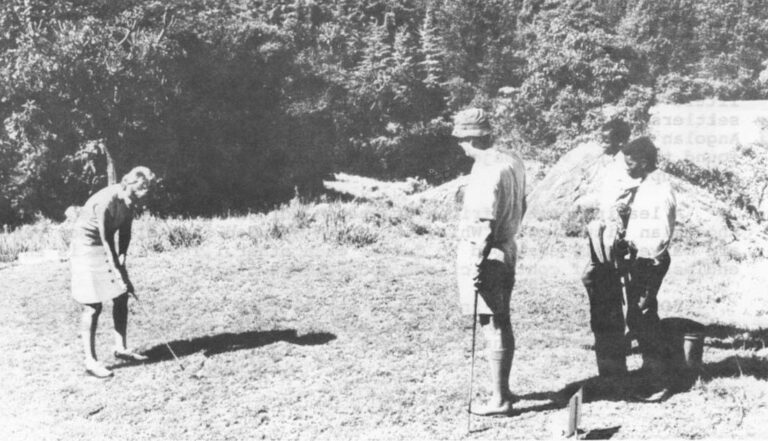
The defense budget has doubled over the past five years and businesses are being drained of manpower to beef up the Rhodesian armed forces. Meanwhile, the government claims only 3,000 blacks have left the country, although the UN Commission on Refugees in Mozambique says it is providing funds for 14,500 who have left Rhodesia since Mozambique became independent on June 25, 1975.
Confined to their isolated country, the Rhodesian white has little opportunity to see how history has altered the role of white settlers on the continent over the past 15 years. Even the bitter Angolan civil war failed to rouse their concern; a survey of whites found that the vast majority viewed it as “just another African punch-up.”
A leading South African newspaper editor summed up the Rhodesian situation: “Whites who have deluded themselves for years are marvelously equipped to delude each other…. The result is an endless flow of contradictions and dubious claims.”
“On the eve of an inevitable takeover by blacks, propaganda seems more important than truth, and morale is better served by boasts and evasions than reality.”
Received in New York on May 17, 1976
©1976 Robin Wright
Robin Wright is an Alicia Patterson Foundation award winner on leave from The Christian Science Monitor. This article may be published with credit to Robin Wright, The Christian Science Monitor, and the Alicia Patterson Foundation.

